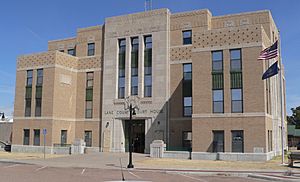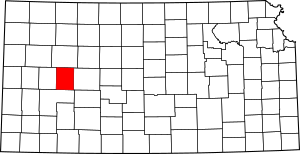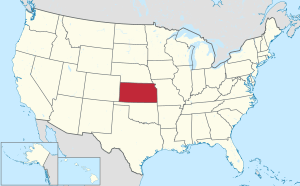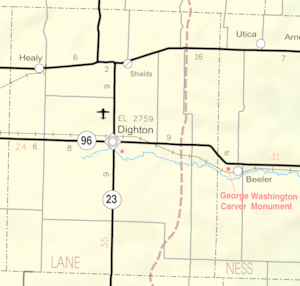Lane County, Kansas facts for kids
Quick facts for kids
Lane County
|
|
|---|---|

Lane County Courthouse in Dighton (2015)
|
|

Location within the U.S. state of Kansas
|
|
 Kansas's location within the U.S. |
|
| Country | |
| State | |
| Founded | March 20, 1873 |
| Named for | James H. Lane |
| Seat | Dighton |
| Largest city | Dighton |
| Area | |
| • Total | 718 sq mi (1,860 km2) |
| • Land | 717 sq mi (1,860 km2) |
| • Water | 0.2 sq mi (0.5 km2) 0.03%% |
| Population
(2020)
|
|
| • Total | 1,574 |
| • Estimate
(2021)
|
1,565 |
| • Density | 2.2/sq mi (0.8/km2) |
| Time zone | UTC−6 (Central) |
| • Summer (DST) | UTC−5 (CDT) |
| Congressional district | 1st |
Lane County is a place in the state of Kansas, United States. It is called a county. The main town, or county seat, is Dighton. Dighton is the only official city in the county.
In 2020, about 1,574 people lived in Lane County. This makes it one of the counties in Kansas with the fewest people. The county got its name from James Lane. He was an important leader who worked to end slavery. He also became one of the first U.S. senators from Kansas.
Contents
History of Lane County
How Lane County Began
For thousands of years, the Great Plains of North America were home to nomadic Native American groups. They moved around to hunt and gather food.
From the 1500s to the 1700s, France said it owned large parts of North America. In 1762, after a big war, France secretly gave this land to Spain. This was part of a deal called the Treaty of Fontainebleau.
The 1800s and Kansas
In 1802, Spain gave most of the land back to France. Then, in 1803, the United States bought a huge area from France. This was called the Louisiana Purchase. Most of what is now Kansas was part of this purchase. The U.S. paid a very small amount for each acre.
In 1854, the area became the Kansas Territory. Later, in 1861, Kansas officially became the 34th U.S. state. Lane County itself was created in 1873.
Geography of Lane County
Lane County covers about 718 square miles. Most of this area is land, about 717 square miles. Only a tiny part, about 0.2 square miles, is water.
Neighboring Counties
Lane County shares borders with these other counties:
- Gove County to the north
- Ness County to the east
- Finney County to the south
- Scott County to the west
People of Lane County
The number of people living in Lane County has changed over the years. Here's a look at the population counts from different years:
- 1880: 604 people
- 1890: 2,060 people
- 1900: 1,563 people
- 1910: 2,603 people
- 1920: 2,848 people
- 1930: 3,372 people
- 1940: 2,821 people
- 1950: 2,808 people
- 1960: 3,060 people
- 1970: 2,707 people
- 1980: 2,472 people
- 1990: 2,375 people
- 2000: 2,155 people
- 2010: 1,750 people
- 2020: 1,574 people
In 2000, there were 2,155 people living in the county. Most people were White (97.73%). A small number were from other racial groups. About 1.44% of the people were Hispanic or Latino.
The average age in the county in 2000 was 42 years old. About 25.40% of the people were under 18 years old.
Government and Elections
Lane County usually votes for the Republican Party in presidential elections. Since 1888, the county has only voted for a Democratic candidate five times. The last time a Democrat won in Lane County was in 1964. That year, Lyndon B. Johnson won by a lot across the country.
Education in Lane County
Lane County has two main school districts:
- Healy USD 468: This school district is planning to join with another one in 2025.
- Dighton USD 482
Communities in Lane County
Here are the main towns and areas in Lane County:
City
- Dighton (This is the county seat, the main town.)
Unincorporated Communities
These are smaller towns or areas that are not officially cities:
- Alamota
- Amy
- Healy (This is a Census-Designated Place, meaning the government counts its population separately.)
- Pendennis
- Shields
Townships
Lane County is divided into five smaller areas called townships. The numbers for these townships include the people living in any cities within them.
| Township | Population | Land area km2 (sq mi) |
Water area km2 (sq mi) |
Water % |
|---|---|---|---|---|
| Alamota | 108 | 414 (160) | 0 (0) | 0% |
| Cheyenne | 336 | 245 (94) | 0 (0) | 0% |
| Dighton | 1,573 | 785 (303) | 0 (0) | 0.01% |
| White Rock | 26 | 207 (80) | 0 (0) | 0.02% |
| Wilson | 112 | 206 (80) | 0 (0) | 0.20% |
See also
 In Spanish: Condado de Lane (Kansas) para niños
In Spanish: Condado de Lane (Kansas) para niños
|
|
 | Delilah Pierce |
 | Gordon Parks |
 | Augusta Savage |
 | Charles Ethan Porter |



